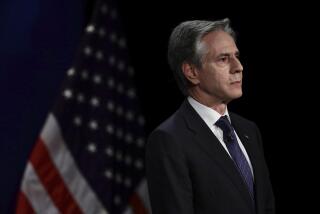Russia Puts Base Closures on Ice
- Share via
MOSCOW — The Russian military Saturday suspended the closure of its two military bases in the former Soviet republic of Georgia, saying it was acting to protect its citizens there as relations between the two countries spiraled downward in the midst of a spy scandal.
Russia reacted angrily to the arrest Wednesday of five Russian military officers. Four of the Russians have been ordered held for two months while investigations continue; the fifth was released Thursday for lack of evidence. Ten Georgian citizens also were detained.
Georgian authorities have demanded the hand-over of a sixth officer, believed to have taken refuge in Russia’s military headquarters in Tbilisi, the Georgian capital. Police have cordoned off the compound, saying they will neither storm the headquarters, which is protected by diplomatic immunity, nor allow the officer to escape. The Russian military has denied that Lt. Col. Konstantin Pichugin is at the compound.
Meanwhile, Russia has been evacuating nonessential diplomats and their families. Ivan Volynkin, a top official at the Russian Embassy in Tbilisi, told Russian news agency RIA Novosti on Saturday that only two diplomats and several security guards would remain.
Alexander Baranov, commander of Russian forces in a southern region that borders Georgia, said Saturday at a news conference in Rostov-on-Don that the base closures were being suspended because Georgia’s actions meant the safety of Russian personnel there could not be guaranteed.
Baranov also said that Russia would prevent Georgian authorities from entering any Russian military facility to apprehend suspected spies.
“The order has been given that any attempts by strangers to enter the garrisons’ territories be prevented, if necessary, by force,” Baranov said. “There is no question of handing over any alleged spies. These are Russian citizens, and any problem should be resolved through dialogue rather than through police escapades.”
Russia and Georgia issued a joint statement in May 2005 in which Russia promised to close the two Soviet-era bases by 2008. One of the facilities is in the Black Sea region of Adzharia; the other is in southern Georgia near the border with Armenia.
Salome Zourabichvili, who was Georgia’s foreign minister when the accord was reached, said at the time that the statement was not legally binding but that it was “politically binding.” The Russian parliament has not ratified a separate protocol implementing the agreement.
Russia also has bases for peacekeeping forces in two breakaway regions of Georgia: Abkhazia and South Ossetia, which border Russia. Tbilisi accuses those units of siding with separatist leaders ruling the two regions, and it wants them gone.
Since his election in 2004 after a nonviolent people’s revolt dubbed the Rose Revolution, Georgian President Mikheil Saakashvili has sought to reassert the country’s sovereignty and territorial integrity.
Using military threats and encouraged by local protests, he quickly won back control of Adzharia. In recent months, he has stepped up pressure on the other two regions.
Moscow has charged that Georgia wants Russian troops gone so it can retake the breakaway areas by force before applying for NATO membership.
Under Saakashvili, Georgia has made joining the North Atlantic Treaty Organization a top priority. It says it wants to achieve reunification peacefully.
Many observers believe that the long-term goal of the separatists in Abkhazia and South Ossetia is to merge with Russia. Russian officials deny having any designs on Georgian territory.
The Russian ambassador to Georgia, Vyacheslav Kovalenko, was recalled to Moscow in protest of the arrests, and he told reporters upon his arrival here Friday that the spying charges had “no solid basis at all.”
Kovalenko dismissed the significance of videotape that allegedly shows the Russian and Georgian detainees conspiring.
Georgian Interior Minister Vano Merabishvili released the video Thursday. It also shows an exchange of money.
More to Read
Sign up for Essential California
The most important California stories and recommendations in your inbox every morning.
You may occasionally receive promotional content from the Los Angeles Times.













